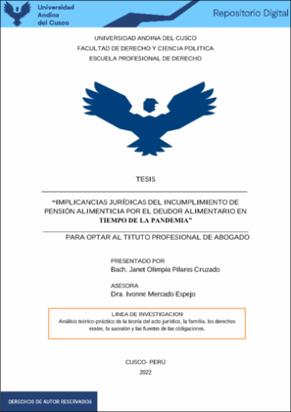| dc.contributor.advisor | Mercado Espejo, Ivonne | |
| dc.contributor.author | Pilares Cruzado, Janet Olimpia | |
| dc.date.accessioned | 2023-07-03T14:12:44Z | |
| dc.date.available | 2023-07-03T14:12:44Z | |
| dc.date.issued | 2022-11-16 | |
| dc.identifier.uri | https://hdl.handle.net/20.500.12557/5530 | |
| dc.description.abstract | Tal como señala el artículo 92, se considera como alimento lo necesario para el sustento,
habitación, vestido, educación, instrucción y capacitación para el trabajo, asistencia médica,
y recreación del niño y del adolescente, siendo característica de este derecho – deber
alimentario el ser inherente a la persona y el ser variable, imprescriptible y reciproco. El
código 93 en el Código de los Niños y Adolescentes establece que es obligación de los padres
de presentar alimentos a sus hijos.
En conclusión, a pesar de haber vivido una época sui generis que es la PANDEMIA, el
derecho de alimentos es un derecho fundamental de atención prioritaria se encuentra muy
ligado a la subsistencia y el desarrollo de la persona, por eso goza de protección.
Se debe tener presente que en la adopción de medidas concernientes al niño y al adolescente,
es de obligatoria observancia, por parte de toda autoridad, el Interés Superior del Niño y el
Adolescente tal como lo prescribe el articulo IX del Título Preliminar del Código de los niños
y adolescentes, que tiene rango constitucional y reconocido asimismo por el articulo IX de
la Convención Americana sobre los derechos del niño, adoptada y abierta a la firma y
ratificación por la Asamblea General de las Naciones Unidas en su resolución 44/25, del 20
de noviembre de 1989; consecuentemente tiene también la categoría de Derecho Humano;
de tal modo que si existiese conflicto entre el Principio del Debido Proceso y el Principio
del Interés Superior del Niño, corresponde predominar el ultimo.
La problemática está basada en las Implicancias jurídicas del incumplimiento de pensión
alimenticia por el deudor alimentario en tiempo de pandemia, teniendo como consecuencia
negativa la afectación de derechos fundamentales de los menores alimentistas,
principalmente a la salud a y a la educación.
En tanto que mi investigación está orientada al enfoque cualitativo, con el conocimiento y
comprensión del tema planteado y no a verificar hipótesis mediante mediciones estadísticas
probabilísticas. las técnicas fueron, análisis documental, la observación y la entrevista y para
su validación, recolección de datos, análisis dogmático, legislativo jurisprudencial para llegar
a los resultados. | es_PE |
| dc.description.abstract | As indicated in article 92, what is necessary for the sustenance, housing, clothing, education,
instruction and training for work, medical assistance, and recreation of the child and
adolescent is considered as food, being characteristic of this right - food duty being inherent
to the person and being variable, imprescriptible and reciprocal. Code 93 in the Children and
Adolescents Code establishes that it is the obligation of parents to present food to their
children.
In conclusion, despite having lived through a sui generis era that is the PANDEMIC, the right
to food is a fundamental right of priority attention, it is closely linked to the subsistence and
development of the person, that is why it enjoys protection.
It should be borne in mind that in the adoption of measures concerning children and
adolescents, it is mandatory for all authorities to observe the Best Interest of the Child and
Adolescent, as prescribed in Article IX of the Preliminary Title of the Code of children and
adolescents, which has constitutional status and is also recognized by Article IX of the
American Convention on the Rights of the Child, adopted and open for signature and
ratification by the United Nations General Assembly in its resolution 44/25 of 20 November
1989; consequently it also has the category of Human Right; in such a way that if there is a
conflict between the Principle of Due Process and the Principle of the Best Interest of the
Child, the latter should prevail.
The problem is based on the legal implications of non-compliance with alimony by the food
debtor in times of pandemic, having as a negative consequence the affectation of the
fundamental rights of minors, mainly health and education.
While my research is oriented to the qualitative approach, with the knowledge and
understanding of the subject raised and not to verify hypotheses through probabilistic
statistical measurements. The techniques were, documentary analysis, observation and
interview and for its validation, data collection, dogmatic analysis, legislative jurisprudence
to reach the results. | en_US |
| dc.format | application/pdf | es_PE |
| dc.language.iso | spa | es_PE |
| dc.publisher | Universidad Andina del Cusco | es_PE |
| dc.rights | info:eu-repo/semantics/openAccess | es_PE |
| dc.rights.uri | https://creativecommons.org/licenses/by-nc-nd/4.0/ | es_PE |
| dc.subject | incumplimiento de pensión | es_PE |
| dc.subject | Derecho de alimentos | es_PE |
| dc.subject | Interés superior del niño y adolescente | es_PE |
| dc.title | Implicancias jurídicas del incumplimiento de pensión alimenticia por el deudor alimentario en tiempo de la pandemia | es_PE |
| dc.type | info:eu-repo/semantics/bachelorThesis | es_PE |
| thesis.degree.name | Abogada | es_PE |
| thesis.degree.grantor | Universidad Andina del Cusco. Facultad de Derecho y Ciencia Política | es_PE |
| thesis.degree.discipline | Derecho | es_PE |
| dc.publisher.country | PE | es_PE |
| dc.subject.ocde | https://purl.org/pe-repo/ocde/ford#5.05.00 | es_PE |
| renati.advisor.dni | 23920468 | |
| renati.advisor.orcid | https://orcid.org/0000-0003-2062-9810 | es_PE |
| renati.author.dni | 23943808 | |
| renati.discipline | 421016 | es_PE |
| renati.juror | Rivero Ynfantas, Fernando | |
| renati.juror | Alvarez Nuñez, Leonidas | |
| renati.juror | Yoshisato Alvarez, Mario | |
| renati.juror | Olivares Torre, Gretel Roxana | |
| renati.level | https://purl.org/pe-repo/renati/level#tituloProfesional | es_PE |
| renati.type | https://purl.org/pe-repo/renati/type#tesis | es_PE |
| dc.description.lineadeinvestigacion | Análisis teórico-práctico de la teoría del acto jurídico, la familia, los derechos reales, la sucesión y las fuentes de las obligaciones | es_PE |


